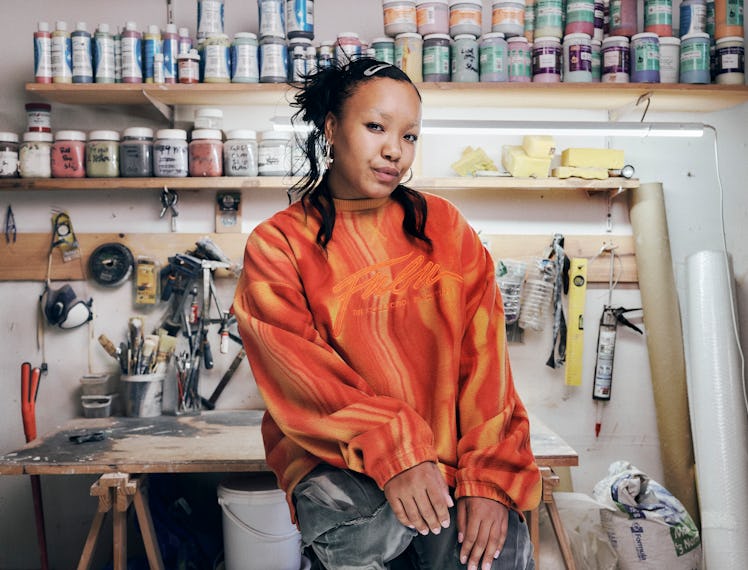Narumi Nekpenekpen Sculpts From the Heart
The ceramicist known for her otherworldly sculptures shares how emotion informs her work.

“I knew you were going to ask me what I’ve been up to while living in France,” the ceramic artist Narumi Nekpenekpen tells me with a laugh from her bedroom in Versailles, where she’s carrying out an artists residency. “Let me show you.”
Nekpenekpen, 23, is one of the most exciting new faces in the art world. Just one year after graduating from California State University, Long Beach, she’s secured a solo show at the gallery Real Pain, on Manhattan’s Lower East Side. The exhibition, titled Angels With Dirty Faces, is filled with her cartoon-ish, slightly wonky, anthropomorphic beings sculpted from clay. The sculptures, which Nekpenekpen has painted, written upon, and drawn onto, creating doe-eyed faces in pink, blue, yellow, and slime green, resemble characters the ceramicist Alice Mackler might have enjoyed. But the characters are certainly not of this earth. Some resemble Sanrio icons, two Badtz-Marus locked in embrace, while others are simply multicolored orbs with spikes, covered in handwritten text.
But when Nekpenekpen shares her Zoom screen to give me a glimpse of how she’s spent her time in Europe, she reveals something unexpected: iPhone photos of the childlike, colorful mosaics on the walls of her local train station. “I’ve been going into Paris every day, because there’s not much to do here in Versailles—it’s conservative and really bougie," she explains. “Seeing these mosaics every day has been—well, inspiring is an understatement.”
It makes sense that Nekpenekpen, whose style and technique are not rooted in any sort of classical training, would draw intrigue from hallucinatory images of aliens, witches, and unknown animalistic blobs. In her own work, Nekpenekpen dives headlong into her feelings, creating pieces that embody the physical representation of a diary entry from the depths of her mind. “That’s how I process all of my pieces,” she says. “What births the value of my work is me being able to reflect how I’m feeling on the inside. I write words on my pieces, but the colors I use, and the facial expressions, and the way I structure the pieces act as this cryptic language of me having a conversation with myself.”
The visual conversation that occurs in Angels With Dirty Faces is a result of “going through a crazy heartbreak,” Nekpenekpen says. “I experienced so much pain that listening to music or watching films that took me out of reality felt more reassuring than being present. But having this show and this deadline and also having a way to exert everything out allowed me to not only focus, but be sincere and vulnerable. All that pain didn’t stay in me.”
Despite their otherworldly, hard-to-explain look, the sculptures evoke feelings of love and longing alternately, which Nekpenekpen says she’s injected into every piece since her early days working with clay at CSU Long Beach. The artist got her start at the state university—where she initially entered with a major in biology—by taking classes within the school’s large ceramics facility. “I always had an interest in clothes—something creative, but I never knew where to express it,” she recalls.
During her second semester of college, Nekpenekpen had a choice: she could either get a financially stable job to help support her parents—both of whom are first-generation immigrants: her father is Nigerian, and her mother is Japanese—or she could take a risk and follow her heart. “I was the only one in the family going to college. And growing up, I had this sense of responsibility to take care of my parents. The risk was prioritizing my own wanting to explore,” she says. She decided to pursue the latter, and subsequently threw herself into clay after watching ceramics instructors like Anabel Juárez and Jennie Jieun Lee. “My first ceramic class, Anabel pounded the clay,” she says. “It going from this solid block to whatever she wanted it to be fascinated me. It was so powerful and badass.”
Nekpenekpen spent the first seven years of her life in Japan, where her parents first met. She says she has strong ties to her Japanese heritage, but has reached a point in her life where she’s closely examining her Nigerian side. “I remember being a kid in Japan, and always getting stares,” she says. “Whenever I asked my parents, they’d say it was because I looked pretty, and never because I looked different. It wasn’t until we moved to the states that I started actually thinking about my identity in such an intense way, because I was confronted by it externally and not personally.”
But at this very moment, Nekpenekpen’s personhood is being shaped by her experience in France, where she has been working on one particular sculpture that will be on view as the centerpiece for Real Pain’s booth at NADA Miami’s show in December. She’s not quite finished with it yet, but knows it will depict a couple holding each other. And of course, the piece will call to those colorful tile murals in the train station—pure, unadulterated emotions that exist in no kind of gray area, straight from the heart of her inner child. “My theme, still and forever, is warmth and love,” she adds.